Volume XIV, Issue 1,
February 2010
Pages 12 & 13 <previous page next page>
Round Robin Training Conversation
February moderator: ![]() Lisa Voss
Lisa Voss
Kinetic Basenjis
My thought, as this is the issue that comes out as pups start to go to their new homes, was; What behavior(s) do you think really pay off for the puppy and owner? How do you get the pup a head start on this behavior?
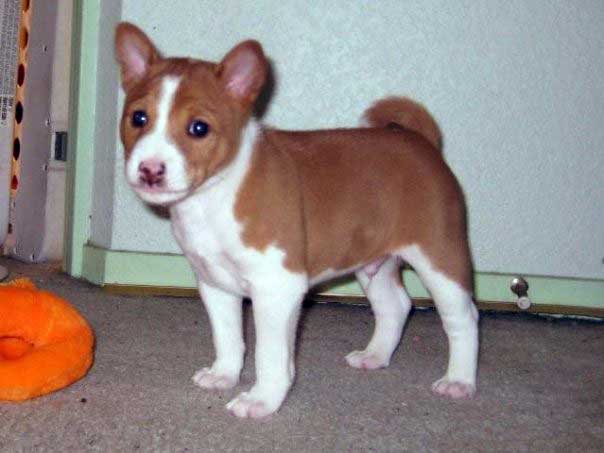 L'Ox at 5 weeks
L'Ox at 5 weeks
For me the one behavior every puppy should learn is Name Response. This become the foundation for several behaviors including a good recall and could save your puppy's life. The great thing about it is that all you need to teach it is some yummy treat, a clicker, and a hungry puppy. I usually start teaching this when I have the pup by itself so there are fewer distractions. I start by saying the pup's name and as soon as I see movement toward me, head turn, ear turn, whatever, I click and treat. The next time I say the pup's name I do the same thing and usually I get an even faster turn as soon as they hear the click because they want the treat. As the pup starts to get the hang of it I slowly raise the bar for the click I stop clicking the ear twitch and only click the head turn, when they have the head turn then I click moving towards me. Pretty quickly though my pup starts to get the idea that as soon as it starts to turn away from me I am just going to say that magic word and they'll be heading right back so they eventually just start to stare waiting, this then leads to the starting point for Attention. As they get good at the Name Response game we start working with more distractions, in the house with the other dogs same thing though, say their name and click and treat for movement towards you, we also work on distance saying their name further away or in another room. Eventually it starts to be more of "come" game. It is easy to practice a few times every day, any time you walk by a treat jar, I have several in my house. The more you practice the more enthusiastically they will come running to their "magic" name. Practice on your walks, practice in the house, practice, practice, practice, so if you ever really need them to respond to that name they will be right there saying, "hey, I heard the magic word!"
![]() Andrea Stone, CCS
Andrea Stone, CCS
University Canine Learning Academy
Saorsa Basenjis
In my experience as a trainer, one of the biggest problems that new dog owners face (and incidentally a significant reason for which dogs are surrendered) is house training. For most of us with Basenjis house training is often quite simple, however there are things breeders can do to help their future puppy owners streamline this process.
I am a big fan of Dr. Ian Dunbar's method of "no mistake" potty training, and fellow Basenji enthusiast Brad Phifer has a great video of his puppy area - Click here. I highly recommend watching this as it is a wonderful setup.
You start out by setting your pups up to succeed. Decide what their "target" surface is for potty purposes. If puppies already have homes lined up you know if they will be "country dogs" who will have access to grassy areas or "city dogs" who will be required to potty on cement. Unless you want pups, once they grow up as well, to prefer paper or soft blanket-like items for elimination stay away from news paper or wee-wee pads, even for baby pups. Dogs don't know the difference between soft blanket-like things and your heirloom quilt, but we sure do!
See, the most salient thing for a dog when he is pottying is what his feet are touching, aka "the substrate". Once a young puppy develops a preference it stays with the dog for its entire lifetime so it's best to start good habits right away. Naturally in order for potty training to begin pups must be mobile. You can start introducing the "puppy toilet" around 4 weeks of age, or younger depending on your pups.
The element in potty training is confinement. This is easy with you the breeder - most of us have "puppy areas" or rooms. When not supervised, puppies should be in their "long term confinement area" or a crate (aka "short term confinement area"). A long-term confinement area is one where the puppies will be housed longer than they can reasonably expect to hold their bowels and bladder - about 15 minutes per week of age. A short-term confinement area is one in which they will be confined for less time than they can "hold it".
Breeders can set up puppy toilets in their puppy pens or room. A cheap option is to get a large roasting pan - one per puppy- and line the bottom with a wee-wee pad. This will help attract the pups. Then place your substrate - sod, woodchips, Astroturf (which can be hosed off and is very grass-like), tiles (turned upside down they feel like sidewalk) or whatever your target surface - on top. If the sides of the roasting pans are too tall, cut and fold one side down. Toilets need to be cleaned regularly - no one likes a dirty bathroom!
Encourage pups to potty in their toilets whenever you can. If weather permits, it is always preferable to encourage pups to "go" outside, just as they will be expected to as adults. When a puppy is successful in pottying where you want him to, always praise and reward him. Several - 3 to 5 ideally - treats go a long way too, in getting the message through. Young puppies should never be allowed to run about unsupervised or in too large an area. This sets them up for mistakes.
By making certain puppies have adequate access to their puppy toilet and by confining them (not enough supervision or access to too large an area are the most common house training mistakes) when you are not supervising them actively you are setting the pups on the path for success. If their families continue your work, house training will be a snap. They will thank you for it!
Dr. Ian Dunbar's "Before and After You Get Your Puppy" is a wonderful reference for puppy owners and I highly recommend it to anyone who ever has a puppy.
![]() Uschi Grewe
Uschi Grewe
ti-abou-Teka Basenjis
Me and Lela and Claudi (Lars’ girlfriend) with Imani at the training class, with the clicker!
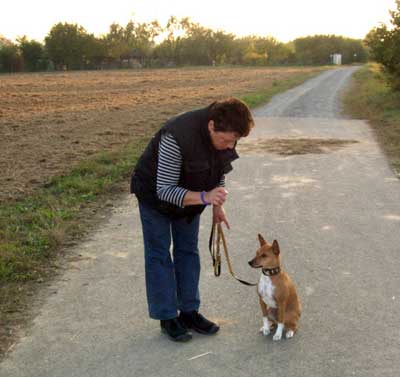
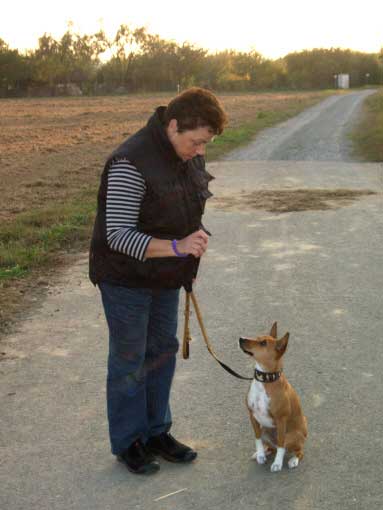
Uschi & Lela
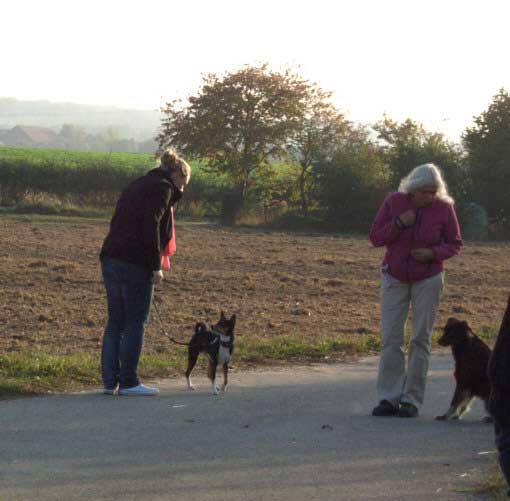
Claudia and Imani
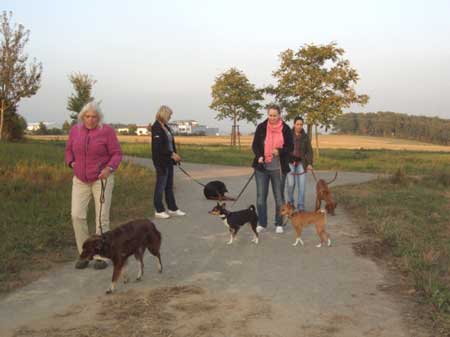 The group.
The group.
